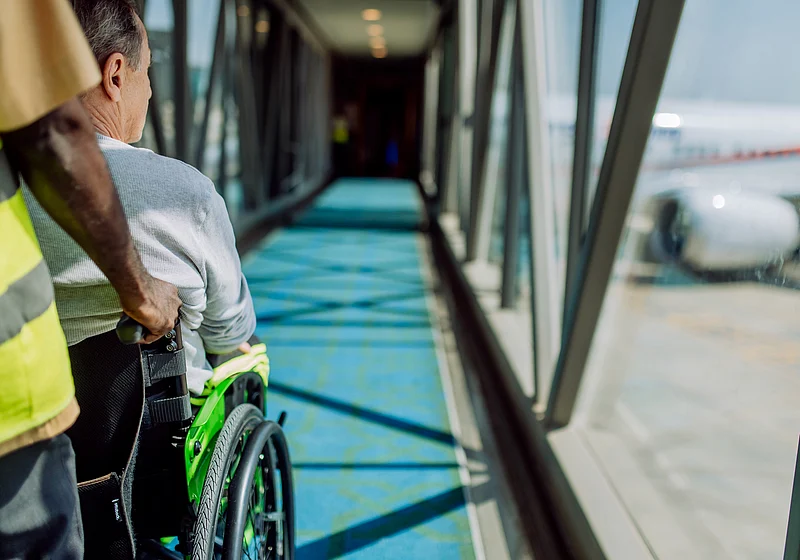Get Healthy!

- Dennis Thompson
- Posted October 6, 2023
Passengers in Wheelchairs Can't Use Most Airplane Washrooms. That Could Change
With airplane bathrooms inaccessible to most people with disabilities, those who use wheelchairs have a necessary pre-flight routine: Dehydrate and hope for the best.
Now, relief is on the way.
Among a series of actions aimed at making air travel easier for people with disabilities, the U.S. Department of Transportation (DOT) finalized a rule late last month that will require new single-aisle airplanes to be designed with handicapped-accessible bathrooms. Some overseas airlines flying to and from the United States already have these bathrooms.
"They'll have grab bars,"said Claire Stanley, a public policy analyst with the National Disability Rights Network. "They'll have a turning radius where someone can get in and actually turn and transfer to the commode."
Problems with airplane bathrooms are only one travel hassle for folks with disabilities. Some arrive at their destination to find their costly, custom wheelchair broken due to improper storage in an airplane's hold.
That's not just an inconvenience, but a serious health hazard, Stanley said.
"If your chair isn't designed right, you can develop pressure sores and that can lead to some pretty awful health problems,"she said. "We hear countless stories of chairs broken in the cargo hold of a plan, where all the luggage is kept."
With this in mind, the DOT also announced an agreement with United Airlines under which the airline will take industry-leading actions to help people locate flights where their wheelchairs can be safely stored and transported.
A new digital feature on United's website will help passengers determine if an aircraft can accommodate their wheelchair. United will refund the fare difference if a costlier flight is needed to accommodate a specific wheelchair size.
The United agreement was prompted by an incident in which a passenger died after her custom wheelchair was damaged during a cross-country flight.
"By offering customers an easy way to know if their personal wheelchair fits on a particular airplane, we can give them the peace of mind they deserve when they fly with us," Linda Jojo, executive vice president and chief customer officer for United, said in a statement. "Plus, collecting this information ahead of time ensures our team can handle these special items with proper care and attention."
United expects to launch its new wheelchair-friendly policies early next year.
But Stanley warned that handicapped-accessible bathrooms on planes are likely still a decade or more away, since the rule applies only to new planes that replace the existing fleet.
"It's not like it's going to happen tomorrow,"she said. "It's not something where you can retrofit. You have to wait for the rollout of the newly designed planes, which is a very long process."
The DOT's agreement with United resulted from a complaint by Engracia Figueroa, 51, who died months after her $30,000 specialized wheelchair broke in the cargo hold during a flight home to Los Angeles from Washington, D.C.
Figueroa had to sit in a broken manual wheelchair for nearly five hours at the L.A. airport while United sorted out what had happened, according to Hand in Hand, the domestic employers' advocacy group she represented.
Figueroa developed a pressure sore while she waited at the airport, and the sore was made worse by the loaner chair she had to use while she fought with United to replace her broken chair, Hand in Hand says.
"The sore became infected and the infection eventually reached her hip bone, requiring emergency surgery to remove the infected bone and tissue,"a Hand in Hand statement says.
Figueroa died Oct. 31, 2021, three months after the July flight in which her wheelchair was broken.
United also agreed to launch a trial program to explore whether medical wheelchairs or other types of chairs can be used to safely accommodate passengers whose personal wheelchairs break during a flight.
"This will include what type of specialized seating equipment should be tested, how and where it will be utilized within the airport, and how best to collect user feedback,"the DOT announcement said.
Stanley said she hopes other airlines will follow United's example.
"It's just basic supply-and-demand economics,"she said. "Passengers will want to go to what is most accessible. Passengers with disabilities, which is a huge percentage in the market, are going to start flocking to one airline, so you'd think the others would follow suit."
In a written statement, the International Air Transport Association said that the DOT final rule on accessible bathrooms "largely tracks the consensus agreement that was reached between airlines, aircraft manufacturers, and disability advocates"in 2016.
"Airlines remain committed to working with regulators and travelers with disabilities for proportionate and workable solutions to the various challenges of ensuring fair and equal access to air travel,"the statement says.
U.S. Transportation Secretary Pete Buttigieg touted the DOT rule, which was finalized on the 33rd anniversary of the Americans With Disabilities Act.
"Traveling can be stressful enough without worrying about being able to access a restroom; yet today, millions of wheelchair users are forced to choose between dehydrating themselves before boarding a plane or avoiding air travel altogether,"Buttigieg said in a statement. "We are proud to announce this rule that will make airplane bathrooms larger and more accessible, ensuring travelers in wheelchairs are afforded the same access and dignity as the rest of the traveling public."
DOT also is laying preliminary groundwork for a potential future rule under which passengers might stay in their own wheelchairs while they fly, the agency said.
Other potential rules would require better training for airline staff who physically assist disabled passengers or handle battery-powered wheelchairs or scooters.
More information
The U.S. Department of Transportation has more about traveling with a disability.
SOURCES: Claire Stanley, public policy analyst, National Disability Rights Network, Washington, D.C.; United Airlines, statement, Sept. 28, 2023; U.S. Department of Transportation, news release, Sept. 28, 2023







